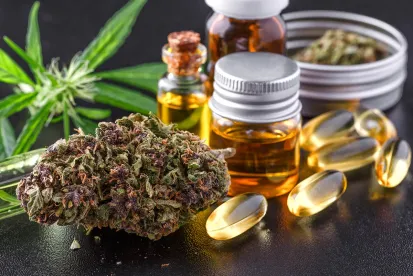You can’t miss them: signs reading “CBD PRODUCTS SOLD HERE” are appearing in gas stations and drug stores across the country. Cannabidiol (“CBD”), a naturally occurring non-psychoactive compound derived from the cannabis plant, is a mainstream product marketed as a supplement that provides health benefits to its users. Proponents claim CBD provides pain relief and reduces feelings of anxiety and depression, among other health benefits. In 2018, the United States Food and Drug Administration (“FDA”) approved Epidiolex, a CBD oral solution, for the treatment of seizures associated with Lennox-Gastaut syndrome and Dravet syndrome, diseases that generally appear in early childhood.
While CBD’s effects are promising, the FDA considers CBD a “new drug” under the Food, Drug and Cosmetic Act (“FD&C”). Under the FD&C, it is generally illegal to introduce a new drug into interstate commerce. The question, therefore, begs – if the FDA considers the sale of CBD illegal, then why are we seeing CBD for sale everywhere?
In 2018, the Agriculture Improvement Act (“2018 Farm Bill”) removed hemp from the definition of marijuana under the federal Controlled Substances Act (“CSA”). Consistent with the 2018 Farm Bill, Pennsylvania adopted a Hemp Program. The program permits the Pennsylvania Department of Agriculture to grant licenses to entities to grow, cultivate, and sell hemp. Under the program, licensees are permitted to grow hemp for the purpose of producing CBD. Other states have adopted similar programs, and under lawful state programs, the industrial hemp industry is growing (pun intended). By 2024, the United States CBD market is expected to reach $20 billion in sales. By 2028, the value of the global industrial hemp market is projected to reach $27.7 billion.
So what’s the hold up? Since 2015, the FDA has issued warning letters to more than a dozen CBD companies for alleged violations of the FD&C. In the warning letters, the FDA claims to have reviewed the companies’ websites (including social media accounts) for evidence of FD&C violations. The FDA explains that the marketed CBD products are “drugs” under the FD&C because the products are “articles intended for the use in the diagnosis, cure, mitigation, treatment, or prevention of disease and/or intended to affect the structure or any function of the body.” 21 U.S.C. § 321(g)(1). The FDA says that the products are “new drugs” because CBD is not generally recognized as safe and effective. See 21 U.S.C. § 321(p). Under the FD&C, new drugs may not be legally introduced or delivered for introduction into interstate commerce without prior approval from the FDA, or unless they are over-the-counter drugs lawfully marketed under 21 U.S.C. § 505G.
Clearly, there is conflict between state and federal authorities. While businesses face exposure under the FD&C, states like Pennsylvania permit CBD production. In the absence of regulation and consistent enforcement, it is likely that the CBD industry will continue to grow. Due to the complexities in the laws, companies operating in the CBD sector may face difficulties in risk management, banking, and logistics. SMGG is tracking changes in the CBD laws and rulemaking process, and we are ready to advise you or your company in navigating CBD’s complex legal landscape.



 />i
/>i

